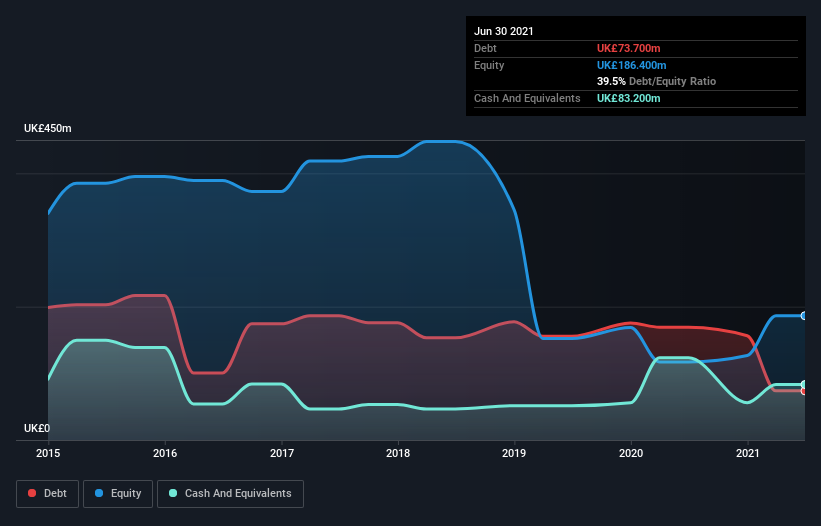Is Pendragon (LON:PDG) A Risky Investment?
David Iben put it well when he said, 'Volatility is not a risk we care about. What we care about is avoiding the permanent loss of capital.' It's only natural to consider a company's balance sheet when you examine how risky it is, since debt is often involved when a business collapses. Importantly, Pendragon PLC (LON:PDG) does carry debt. But the real question is whether this debt is making the company risky.
When Is Debt A Problem?
Debt assists a business until the business has trouble paying it off, either with new capital or with free cash flow. Part and parcel of capitalism is the process of 'creative destruction' where failed businesses are mercilessly liquidated by their bankers. However, a more frequent (but still costly) occurrence is where a company must issue shares at bargain-basement prices, permanently diluting shareholders, just to shore up its balance sheet. By replacing dilution, though, debt can be an extremely good tool for businesses that need capital to invest in growth at high rates of return. When we think about a company's use of debt, we first look at cash and debt together.
Check out our latest analysis for Pendragon
What Is Pendragon's Debt?
The image below, which you can click on for greater detail, shows that Pendragon had debt of UK£73.7m at the end of June 2021, a reduction from UK£169.3m over a year. However, its balance sheet shows it holds UK£83.2m in cash, so it actually has UK£9.50m net cash.
A Look At Pendragon's Liabilities
According to the last reported balance sheet, Pendragon had liabilities of UK£839.1m due within 12 months, and liabilities of UK£397.1m due beyond 12 months. Offsetting this, it had UK£83.2m in cash and UK£122.7m in receivables that were due within 12 months. So its liabilities total UK£1.03b more than the combination of its cash and short-term receivables.
This deficit casts a shadow over the UK£264.9m company, like a colossus towering over mere mortals. So we definitely think shareholders need to watch this one closely. After all, Pendragon would likely require a major re-capitalisation if it had to pay its creditors today. Pendragon boasts net cash, so it's fair to say it does not have a heavy debt load, even if it does have very significant liabilities, in total.
Pleasingly, Pendragon is growing its EBIT faster than former Australian PM Bob Hawke downs a yard glass, boasting a 140% gain in the last twelve months. There's no doubt that we learn most about debt from the balance sheet. But it is future earnings, more than anything, that will determine Pendragon's ability to maintain a healthy balance sheet going forward. So if you want to see what the professionals think, you might find this free report on analyst profit forecasts to be interesting.
Finally, a business needs free cash flow to pay off debt; accounting profits just don't cut it. While Pendragon has net cash on its balance sheet, it's still worth taking a look at its ability to convert earnings before interest and tax (EBIT) to free cash flow, to help us understand how quickly it is building (or eroding) that cash balance. During the last three years, Pendragon burned a lot of cash. While investors are no doubt expecting a reversal of that situation in due course, it clearly does mean its use of debt is more risky.
Summing up
While Pendragon does have more liabilities than liquid assets, it also has net cash of UK£9.50m. And we liked the look of last year's 140% year-on-year EBIT growth. Despite its cash we think that Pendragon seems to struggle to handle its total liabilities, so we are wary of the stock. There's no doubt that we learn most about debt from the balance sheet. However, not all investment risk resides within the balance sheet - far from it. For example Pendragon has 2 warning signs (and 1 which is a bit unpleasant) we think you should know about.
At the end of the day, it's often better to focus on companies that are free from net debt. You can access our special list of such companies (all with a track record of profit growth). It's free.
This article by Simply Wall St is general in nature. We provide commentary based on historical data and analyst forecasts only using an unbiased methodology and our articles are not intended to be financial advice. It does not constitute a recommendation to buy or sell any stock, and does not take account of your objectives, or your financial situation. We aim to bring you long-term focused analysis driven by fundamental data. Note that our analysis may not factor in the latest price-sensitive company announcements or qualitative material. Simply Wall St has no position in any stocks mentioned.
Have feedback on this article? Concerned about the content? Get in touch with us directly. Alternatively, email editorial-team (at) simplywallst.com.

 Yahoo Finance
Yahoo Finance 
